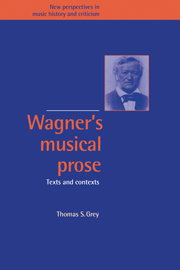Book contents
- Frontmatter
- Contents
- Preface
- 1 Wagner and the problematics of “absolute music” in the nineteenth century
- 2 Beethoven reception and the hermeneutic impulse: “poetic ideas” and new forms
- 3 Engendering music drama: Opera and Drama and its metaphors
- 4 The “poetic-musical period” and the “evolution” of Wagnerian form
- 5 Endless melodies
- 6 Motives and motivations: leitmotif and “symphonic” drama
- Appendix 1 The “poetic-musical period” (from Opera and Drama, Part III, section 3)
- Appendix 2 Principal writings of Richard Wagner cited in the text
- Bibliography
- Index
6 - Motives and motivations: leitmotif and “symphonic” drama
Published online by Cambridge University Press: 22 September 2009
- Frontmatter
- Contents
- Preface
- 1 Wagner and the problematics of “absolute music” in the nineteenth century
- 2 Beethoven reception and the hermeneutic impulse: “poetic ideas” and new forms
- 3 Engendering music drama: Opera and Drama and its metaphors
- 4 The “poetic-musical period” and the “evolution” of Wagnerian form
- 5 Endless melodies
- 6 Motives and motivations: leitmotif and “symphonic” drama
- Appendix 1 The “poetic-musical period” (from Opera and Drama, Part III, section 3)
- Appendix 2 Principal writings of Richard Wagner cited in the text
- Bibliography
- Index
Summary
Composers of the modern, post-Beethovenian era were, from Wagner's perspective, caught in a dilemma arising from the conflict between inexorable “world-historical” cultural forces and inflexible musical conventions. Wagner shared the view of many contemporaries (as I have proposed throughout earlier chapters) that music, as an art or a “language” of emotional expression, must naturally evolve in its capacity to express a more complex, varied, and “distinct” content. Without sacrificing its status as a “higher language” of feelings, it was nonetheless seen as driven by a natural urge toward articulate communication. But like another group of his contemporaries – mostly anti-Wagnerians, by nature – he also subscribed to the doctrine that instrumental musical forms were constrained to abide by conventional structuring principles inscribed in the very nature of tonality, human perception, and the body, if these forms were to preserve the impression (at least) of autonomous intelligibility. Where he differed from this latter, conservative group was in his conviction that a poetic-dramatic text could serve as a pretext for departing from such conventionalized formal principles – offering a poetic license, as it were, for their transgression, and at the same time explaining it. (Here he appeared in his more accustomed role as sponsor of progressive ideals, although it was a role he was more and more loath to assume publicly.) Are the two stances compatible – conservative connoisseur of classical symphonies and radical aesthetic theorist of the avant-garde?
- Type
- Chapter
- Information
- Wagner's Musical ProseTexts and Contexts, pp. 305 - 374Publisher: Cambridge University PressPrint publication year: 1995

